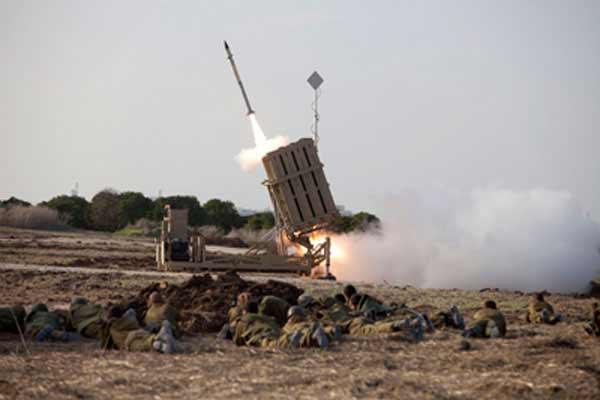The U.S. agreed to assist in funding Israel's attempts to fill gaps in its missile defense network as the buildup to a potential showdown over Iran's nuclear programs continues.
"We highly appreciate your plans to help us in the future" with the financing of the expansion of the Iron Dome missile shield and more advanced systems, outgoing Israeli Defense Minister Ehud Barak told Defense Secretary Leon Panetta at a joint news conference at the Pentagon. "We are determined to complete the system."
Panetta noted that Iron Dome had an 85 percent success rate in intercepting short-range Qassam missiles fired by Hamas from the Gaza Strip during the recent eight-day conflict.
"I assured the minister (Barak) that our strong commitment to Iron Dome would continue in the future. We will obviously continue to work together to seek additional funding" from Congress, Panetta said.
The U.S. earlier this year added $70 million to the $205 million that had already been committed to Iron Dome. The Fiscal Year 2013 version of the National Defense Authorization Act passed by the House last May, and now being debated by the Senate, included an additional $680 million in funding for an expansion of Iron Dome and aid in building more advanced systems.
Iron Dome was designed to intercept short-range missiles and artillery fired by Hamas. Israel currently is testing another system called "David's Sling" to guard against longer-range threats from Hezbollah in Lebanon.
Israel has been working on upgraded versions of its Arrow missile defense system to guard against the Scud threat from Iran should Israel decide to attack Iran's underground nuclear sites.
Barak was the highest-ranking Israeli official to visit Washington since the U.S. election in which Prime Minister Benjamin Netanyahu, who has had a testy relationship with President Obama, was seen as favoring Mitt Romney, an old friend from their business school days in Massachusetts. By coincidence, Romney was paying a post-election courtesy call at the White House while Barak was at the Pentagon.
Barak's visit also coincided with the United Nations General Assembly vote that was expected to grant "non-member observer state" status to the Palestinian Authority of Mahmoud Abbas that holds sway on the West Bank. The U.S. opposed the vote, which had overwhelming support in the Assembly.
Barak said the UN action could complicate relations with the Palestinians but "the most important urgent need is to open direct negotiations" between Israel and the Palestinians on a two-state solution.
A robust role for the U.S. in the Mideast was vital in meeting the challenges posed by the Arab Spring, the civil war in Syria, and the threat from Iran, Barak said.
"Everybody is looking to the U.S.," he said. For Israel's part, "We do not desire war; we pursue peace, but unfortunately the neighborhood is very tough. We are determined to make Israel stronger and more secure," Barak said.
Earlier, Barak, 70, a former chief of the Israeli Defense Forces who once commanded Netanyahu as head of the elite Sayeret Metkal commando unit, was given a red-carpet welcome to the Pentagon and was awarded the Medal for Distinguished Public Service by Panetta, the highest award that can be given by the Defense Secretary. In return, Barak gave Panetta a glass-enclosed model of the Iron Dome interceptor rocket.





























